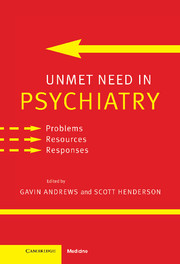Book contents
- Frontmatter
- Contents
- List of Contributors
- Preface
- Part I Unmet need: defining the problem
- Part II Unmet need: general problems and solutions
- Part III Unmet need: people with specific disorders
- Introduction
- 13 The unmet needs of people suffering from schizophrenia
- 14 The early course of schizophrenia: new concepts for early intervention
- 15 Unmet need in depression: varying perspectives on need
- 16 Unmet need following serious suicide attempt: follow-up of 302 individuals for 30 months
- 17 Met and unmet need for interventions in community cases with anxiety disorders
- 18 The unmet need for treatment in panic disorder and social phobia
- 19 Alcohol-use disorders: who should be treated and how?
- 20 Putting epidemiology and public health in needs assessment: drug dependence and beyond
- 21 Why are somatoform disorders so poorly recognized and treated?
- Part IV Unmet need: specific issues
- Part V Unmet need: conclusion
- Index
14 - The early course of schizophrenia: new concepts for early intervention
from Part III - Unmet need: people with specific disorders
Published online by Cambridge University Press: 21 August 2009
- Frontmatter
- Contents
- List of Contributors
- Preface
- Part I Unmet need: defining the problem
- Part II Unmet need: general problems and solutions
- Part III Unmet need: people with specific disorders
- Introduction
- 13 The unmet needs of people suffering from schizophrenia
- 14 The early course of schizophrenia: new concepts for early intervention
- 15 Unmet need in depression: varying perspectives on need
- 16 Unmet need following serious suicide attempt: follow-up of 302 individuals for 30 months
- 17 Met and unmet need for interventions in community cases with anxiety disorders
- 18 The unmet need for treatment in panic disorder and social phobia
- 19 Alcohol-use disorders: who should be treated and how?
- 20 Putting epidemiology and public health in needs assessment: drug dependence and beyond
- 21 Why are somatoform disorders so poorly recognized and treated?
- Part IV Unmet need: specific issues
- Part V Unmet need: conclusion
- Index
Summary
In schizophrenia, the first contact with mental health services is frequently preceded by a lengthy, mostly untreated prephase. We have retrospectively studied a population-based sample of 232 first episodes of broadly defined schizophrenia, using a semi-structured interview (interview for the retrospective assessment of the onset of schizophrenia, IRAOS) from first admission to the first sign of the disorder. A representative subsample (n=115) was followed prospectively over six occasions until five years after first admission. Three-quarters of the cases began with a prodromal phase, lasting five years on average. This was followed by a psychotic prephase of about one year with an exponential increase in all symptoms until the climax of the first episode.
The ten most frequent initial signs were predominantly negative and affective symptoms, including indicators of functional impairment. Depressive symptoms following the first psychotic symptom showed a significant correlation with the score of positive symptoms in the first psychotic episode. A lack of early depressive symptoms is a significant prediction of affective flattening and a weaker prediction of anhedonia over the five years after first admission.
Social disability occurred as early as two to four years before first admission. Compared with age-and sex-matched controls from the general population, the patients at onset of illness did not differ significantly from their healthy peers in terms of social status, but already showed considerable social deficits. These emerged in the prodromal phase, long before first admission. In early-onset cases, the expected social ascent was impeded, whereas in late-onset cases there was considerable downward drift from a higher status at onset.
- Type
- Chapter
- Information
- Unmet Need in PsychiatryProblems, Resources, Responses, pp. 218 - 232Publisher: Cambridge University PressPrint publication year: 2000
- 2
- Cited by

